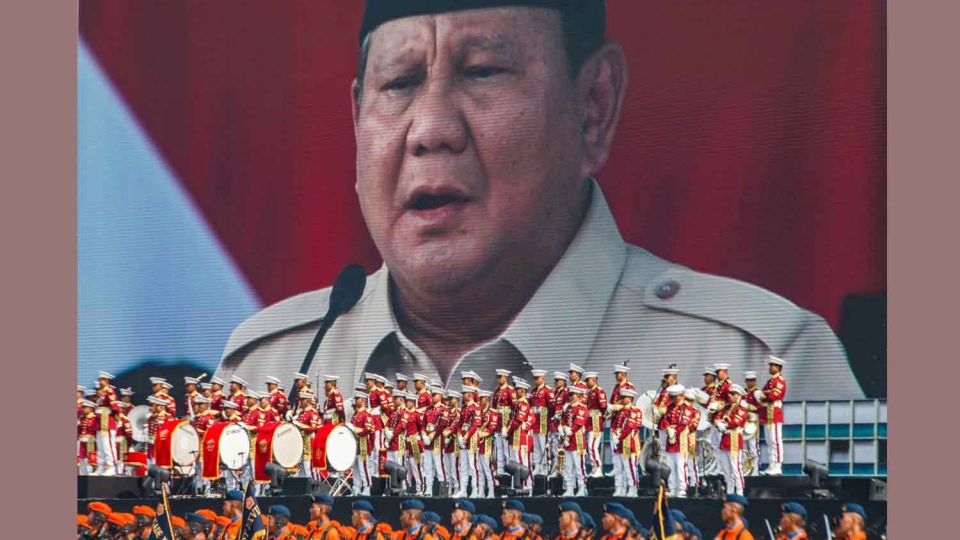October 8, 2025
JAKARTA – As a long-standing supporter of Palestine, Indonesia must more clearly affirm its backing, experts say, warning that Jakarta’s recent efforts to balance Israeli security with Middle East diplomacy have raised questions about the country’s foreign policy priorities.
Indonesia’s evolving approach in the Middle East, they added, must be matched with transparent steps prioritizing Palestinian interests, cautioning that failure to do so could fuel perceptions of a diplomatic shift both domestically and internationally.
Attention has returned to Gaza as global leaders intensify talks aimed at ending ongoing atrocities and charting a political path amid mounting international pressure for decisive action.
The Israeli siege and bombardment of Gaza, approaching its second anniversary on Oct. 7, have dominated international discourse, with September’s United Nations General Assembly (UNGA) largely focused on advancing Palestinian statehood and realizing the long-sought two-state solution.
Observers highlighted several pivotal developments from this latest round of diplomacy, including shifts in several Western nations’ positions on Palestinian statehood and United States-led talks with Arab and Muslim leaders that ultimately endorsed Washington’s 20-point peace plan.
Indonesia, representing the world’s largest Muslim population through President Prabowo Subianto, also drew global attention.
Prabowo made headlines at the UNGA by declaring Indonesia’s readiness to immediately recognize Israel and support “all guarantees” for its security once Palestinian statehood is accepted, emphasizing that lasting peace could not be achieved without assurances for Tel Aviv’s safety.
His remarks provoked strong reactions from Indonesia’s largely pro-Palestinian public but were warmly received by Israel and the US, with US President Donald Trump congratulating Prabowo on his “great speech”. Israeli Prime Minister Benjamin Netanyahu, meanwhile, described it as an “encouraging” step toward potential ties with Muslim countries.
Domestic anger intensified when Prabowo appeared on Israeli billboard advertisements promoting Trump’s peace plan, shared online by the Abrahamic Shield of the Coalition for Regional Security.
In response, the Foreign Ministry reiterated last week its “very clear” stance that any recognition of Israel must begin with acknowledgment of Palestinian independence and sovereignty.
However, the ministry did not explicitly disapprove of the use of Prabowo’s images for promotional purposes, nor did it specify what concrete measures, such as troop withdrawals or accountability for Gaza’s atrocities, would constitute recognition.
To The Jakarta Post, ministry spokesperson Yvonne Mewengkang clarified that Israel’s recognition of Palestine will be deemed “meaningless” by Indonesia if it continued “occupation, military operation, and policies that injure Palestinian sovereignty”.
“The essence of the two-state solution is for Palestine and Israel to live side by side in peace and equality. This requires a permanent ceasefire, an end to the occupation, a halt to violence, and guarantees for the establishment of a sovereign Palestinian state. Normalization is only possible within this framework,” Yvonne said.
Analysts noted that while Indonesia’s formal foreign policy remains technically unchanged, public perception has shifted due to Prabowo’s perceived softer tone toward Israel.
“The government’s tone [under Prabowo] has shifted from the previous administration, which was far firmer in condemning Israel. This is a problem. While we continue to support Palestine, our much softer approach toward Israel raises questions about our diplomatic priorities,” said Yon Machmudi, a Middle East expert at the University of Indonesia (UI).
Aberystwyth University international relations expert Ahmad Rizky M. Umar agreed that Indonesia’s departure from its traditional stance is clear, citing Prabowo’s UNGA speech as one of the first instances the country refrained from publicly condemning Israel.
He suggested that pressure from the US and Israel may be influencing Jakarta’s approach as Prabowo positions himself as a more active player in Middle Eastern affairs, a region historically outside Indonesia’s core diplomatic focus.
“Indonesia has historically not been prominent in the Middle East, focusing instead on ASEAN and Indo-Pacific affairs. Prabowo’s push for a bigger role in the region has increased pressure to establish ties with Israel, even as Jakarta’s diplomatic capabilities remain limited,” Umar said.
Since taking office last year, Prabowo has sought to assert himself as a foreign policy leader, expanding Indonesia’s outreach beyond its traditional ASEAN-focused diplomacy. While this signals ambition, analysts caution that Indonesia may be overextending its influence.
With limited leverage in the Middle East, Indonesia is unlikely to maintain a firm pro-Palestine stance without accommodating more powerful regional actors, Umar said, suggesting Indonesia might better serve Palestinian interests by concentrating on its traditional strengths rather than seeking a high-profile role in the region.
“We have to measure our capabilities and understand the situation clearly. A mismatch between policy, ambitions and capability could be disastrous domestically,” he added.


